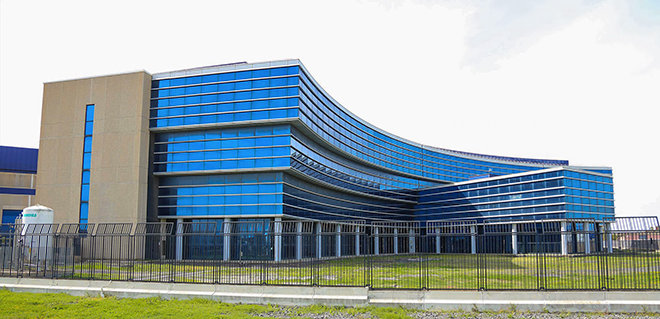S&P Global Offerings
Featured Topics
Featured Products
Events
S&P Global Offerings
Featured Topics
Featured Products
Events
S&P Global Offerings
Featured Topics
Featured Products
Events
Banking & Capital Markets
Economy & Finance
Energy Transition & Sustainability
Technology & Innovation
Podcasts & Newsletters
Banking & Capital Markets
Economy & Finance
Energy Transition & Sustainability
Technology & Innovation
Podcasts & Newsletters
S&P Global Offerings
Featured Topics
Featured Products
Events
1 Apr, 2022

By Camilla Naschert

| The 3Sun solar panel factory in Italy, which Enel plans to ramp up from 200 MW to 3 GW by 2024. Source: Enel SpA |
Enel SpA and renewables unit Enel Green Power SpA received grant funding from the European Union to increase the annual production capacity of a solar module factory in Italy from 200 MW to 3 GW by 2024, as the EU's energy commissioner expressed a desire to ramp up homegrown manufacturing.
Enel's 3Sun factory in Sicily, which will receive €118 million from the EU's Innovation Fund, is set to become Europe's largest factory producing bifacial photovoltaic modules, the company said April 1. The total investment in the plant's expansion will be €600 million.
The EU imports almost all of its solar panels, mostly from China, and Enel said its expanded plant will play a strategic role in returning some solar manufacturing to Europe.
"The sourcing footprint of these important components is a weak point in the global supply chain, and we see the need to rebalance its geographic spread that is today excessively dependent on a single Asian source," CEO Francesco Starace said in a statement.
The plan comes amid geopolitical and regulatory risks relating to the solar industry's dependence on China. In December 2021, the U.S. government issued a de facto ban on all imports from solar manufacturing hub Xinjiang over reports of forced labor in the region. China denies the use of forced labor.
Meanwhile, the EU launched a reporting requirement for imports into the bloc, which will also include supply chains' exposure to workers' rights violations. A ban on forced labor will also be introduced, the European Commission has pledged, though no detail on the implementation has been given yet.
Enel expects to expand the annual capacity of its production facility to 3 GW by July 2024, with an interim target of 400 MW by September 2023. Modules at the factory will be used for Enel's own solar projects and will also be sold to third parties, a spokesperson said. The expanded 3Sun site will add 1,000 jobs to the area, according to the company.
"The gigafactory will promote a circular economy concept, creating a more sustainable and resilient European supply chain, from the design phase to the new models of reusing components at the end of their life cycle," Salvatore Bernabei, CEO of Enel Green Power, said in a statement.
The project has a high potential for scalability and could become a model to develop other large photovoltaic factories in Europe over the coming years, Bernabei added.
'Whatever it takes' for more solar manufacturing
The EU has just over 8 GW of annual solar module manufacturing capacity, according to trade group SolarPower Europe, and EU Energy Commissioner Kadri Simson this week pledged to boost domestic manufacturing capabilities.
Part of the momentum stems from the war in Ukraine, which prompted the EU to set out a plan to end its reliance on Russian gas imports by 2027. Alongside LNG imports and other gas diversification, ramped-up renewables deployment is also part of this strategy.
"The events in Ukraine remind us of an uncomfortable truth: we are too reliant on Russian fossil fuels," Simson said at SolarPower Europe's annual conference in Brussels on March 31. "And as long as we continue like this, we are not fully in control of our energy future. That needs to change."
Solar is part of the solution, Simson said, adding that the commission will publish a dedicated solar strategy before the summer. Alongside issues like permitting, the push for more solar manufacturing is gaining traction.
"Europe used to be known as a manufacturing powerhouse," Simson said. "We need to bring manufacturing back to Europe, and the commission is willing to do whatever it takes to make it happen."
One of the commission's steps will be increasing funding for such plants, which today struggle to compete with export hubs in Asia.
"It was uplifting to hear commissioner Simson's strong commitment to the development of EU solar manufacturing," Walburga Hemetsberger, CEO of SolarPower Europe, said in an emailed statement April 1. "We have our sights set on 20 GW of domestic solar manufacturing by 2025, and we hope the commission's renewed commitment will take us there."
S&P Global Commodity Insights produces content for distribution on S&P Capital IQ Pro.
